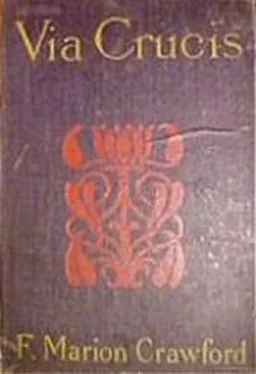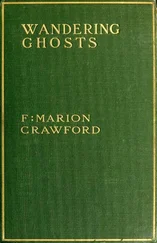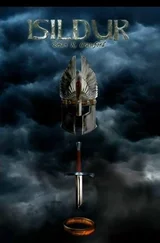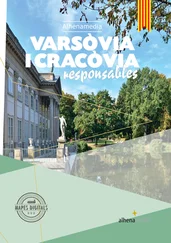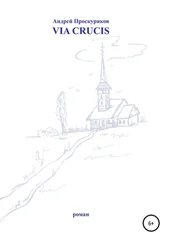F. Crawford - Via Crucis
Здесь есть возможность читать онлайн «F. Crawford - Via Crucis» весь текст электронной книги совершенно бесплатно (целиком полную версию без сокращений). В некоторых случаях можно слушать аудио, скачать через торрент в формате fb2 и присутствует краткое содержание. Жанр: Исторические приключения, на английском языке. Описание произведения, (предисловие) а так же отзывы посетителей доступны на портале библиотеки ЛибКат.
- Название:Via Crucis
- Автор:
- Жанр:
- Год:неизвестен
- ISBN:нет данных
- Рейтинг книги:3 / 5. Голосов: 1
-
Избранное:Добавить в избранное
- Отзывы:
-
Ваша оценка:
- 60
- 1
- 2
- 3
- 4
- 5
Via Crucis: краткое содержание, описание и аннотация
Предлагаем к чтению аннотацию, описание, краткое содержание или предисловие (зависит от того, что написал сам автор книги «Via Crucis»). Если вы не нашли необходимую информацию о книге — напишите в комментариях, мы постараемся отыскать её.
Via Crucis — читать онлайн бесплатно полную книгу (весь текст) целиком
Ниже представлен текст книги, разбитый по страницам. Система сохранения места последней прочитанной страницы, позволяет с удобством читать онлайн бесплатно книгу «Via Crucis», без необходимости каждый раз заново искать на чём Вы остановились. Поставьте закладку, и сможете в любой момент перейти на страницу, на которой закончили чтение.
Интервал:
Закладка:
But meanwhile the news had spread quickly that it was the silent Englishman, neither knight nor squire, who had saved the Queen, and outside the tent men stopped and talked of the deed, and asked questions of Alric, who had picked up enough Norman-French to give tolerably intelligible answers. At first came soldiers, passing as they went to fetch water from the lake, and again as they came back with copper vessels filled to the brim and dripping upon their shoulders, they set down their burdens and talked together. Presently came a great knight, the Count of Montferrat, brother to the Count of Savoy, who had been at Vezelay, where Gilbert had talked with him. He walked with slow strides, his bright eyes seeming to cut a way for him, his long mantle trailing, his soft red leather boots pushed down in close creases about his ankles, his gloved hand pressing down the cross-hilt of his sword, so that the sheath lifted his mantle behind him. On each side of him walked his favourite knights, and their squires with them, all on their way to the King's quarters, where a council of war was to be held, since it was known how the great German host had been routed, and that the Emperor himself might follow Duke Frederick of Suabia. This Duke had already reached the camp, after beating off the Seljuk skirmishers who had harassed his retreat and driven in the first fright-struck Germans.
The soldiers and grooms made way for the noble, but he asked which might be the tent of Gilbert Warde, the Englishman; so they pointed to the raised flap, where Alric stood with his sturdy legs apart, under the shadow of Gilbert's long shield, which was hanging from a lance stuck in the ground. The shield was blank, though many gentlemen already painted devices on theirs, and sovereign lords displayed the heraldic emblems of their houses long before their vassals began to use their coats-of-arms on their shields in war. But Gilbert would bear neither emblem nor device till some great deed should make him famous.
The Count of Montferrat glanced at the blank shield thoughtfully, and asked little Alric of what family his master was; and when he heard that his forefathers had been with Robert the Devil when he died, and with William at Hastings, and with Godfrey at Jerusalem, and that his father had died fighting for Maud against the usurper, but that Gilbert had not knighthood for all that, he wondered gravely. Yet knowing that he was hurt and ill at ease, the Count would not go in, but gave Alric a piece of gold and bade him greet the young Lord of Stoke and tell him that the Count of Montferrat craved better acquaintance with him when he should be recovered.
He went on his way, and was not gone far when the Count of Savoy and the lord of fated Coucy came strolling side by side, with their trains of knights and squires, on their way to the council. And having seen Montferrat stop at the tent, they did likewise, and asked the same questions, giving Alric money out of respect for his master's brave deed and good name, according to custom. Many others came after them, great and small, and the great gave the groom money, and the poor men— at-arms asked him to drink with them after supper; so that his flat leathern wallet, which was cracking in its creases from having been long empty, was puffed out and hard, and weighed heavily at his belt, and as for the wine promised him, he might have floated a boat in it.
There was one of the Greek guides who stood near the tent, playing with a string of thick beads, and keeping behind Alric; and when there was a crowd around him this Greek slipped nearer, with his razor in the palm of his hand, and stealthily tried to cut the thongs by which the wallet was fastened. So the Saxon turned quickly and smote him between the eyes with his fist, and it was an hour before the Greek came to himself and crawled away, for nobody would lift him. But Alric laughed often as he sucked the trickling blood from his knuckles, and though he was a little man and young, the soldiers looked at him with respect, and many more of them asked him to drink.
So on that afternoon Gilbert's reputation grew suddenly, as a bright lily that has been long in bud under a wet sky breaks out like a flame in the first sunshine; and the days were over when he must trudge along unnoticed in the vast throng of nobles, with his two men and his modest baggage.
Meanwhile the council was held in the King's tent of state, within which three hundred nobles sat at ease after the King himself had taken his place on the throne, with the Queen on his right hand. There the red-bearded Frederick of Suabia, nephew to Conrad and famous afterward as the Emperor Barbarossa, stood up and told his tale: how the wild German knights had truly forced their leaders to take the mountain road and fight the Seljuks at a disadvantage; how the Seljuks appeared and disappeared again from hour to hour, falling upon their prey at every turn, reddening every pass with blood, and leaving half-killed men among the slain to wonder whence the swift smiters had come and whither they were gone. He himself had wounds not healed, and he told how, day by day, the mad bravery of the Germans, and the fury of his Black Forest men-at-arms, had risen again and again to very desperation, to sink before evening in a new defeat; until, at last, as the Seljuk swords still killed and killed, a terror had fallen upon the host in the passes, and men had thrown away their armour and fled like rats from a burning granary, so that their leaders could not hold them. He, with a few strong helpers, had covered his flying troops, and the brave Emperor Conrad, giant in strength, the greatest swordsman of the world, was even now fighting at the hindmost rear of the army to save whom he could.
It had been madness, he told them all, to try the mountain ways. To Palestine there were two roads, and they might choose between them, either following the long coast round Asia Minor to the Gulf of Cyprus, or else, going down to the Propontis, they might get ships from Constantinople and sail to the ports of Syria. The short way was death, and though death were nothing, it meant failure and destruction to the Christian power in Jerusalem and Antioch.
Thus he spoke, and the King and Queen and all the great nobles heard him in silence. There were the great Counts of Flanders and Toulouse, of Savoy, of Montferrat and Dreux and Blois, and the lords of Lusignan, of Coucy, of Courtenay, and of Bourbon, and the Bishops of Toul and Metz, and all the great knights of Gascony and Poitou, with many others of high name and good blood, who heard the red-bearded Duke speak. But when he had finished, none answered him, and the French King sat on his throne, repeating the prayers for the dead in a low voice. But Eleanor's eyes flashed fire and her gloved hand strained impatiently upon the carved arm of the chair of state.
"Requiem eternam dona eis," muttered the King.
"Amen!" responded Eleanor, in a clear, contemptuous voice. "And now that prayers are over, let us do deeds. Let us mount and ride forth at dawn to meet the Emperor, and help him in his need at the last. Let us ride in even order, sending out scouts and skirmishers before us, and keeping good watch, armed and ready at all moments. Then, when all are safe who are alive, we will return here, that the Germans may rest themselves by this good lake; and afterward we will set forth again by the safest road, cautiously, not wasting upon skirmishes the strength we shall need hereafter for a great victory."
"The Emperor will surely be here to-morrow, without our help," said the King, in manifest discontent. "It is of no use to go and meet him."
"If he is so near, let us mount to-night, this very hour, rather than have on us the shame of lying idly here while men who wear the cross are in need of us."
The King said nothing, but at Eleanor's words a low murmur of assent ran through the assembly of brave men, from those at her feet to those farthest from her; and the impatient touch of each hand on sword or dagger, at the thought of fight, made a sound of softly moving steel and leather and buckle, which one may only hear among soldiers.
Читать дальшеИнтервал:
Закладка:
Похожие книги на «Via Crucis»
Представляем Вашему вниманию похожие книги на «Via Crucis» списком для выбора. Мы отобрали схожую по названию и смыслу литературу в надежде предоставить читателям больше вариантов отыскать новые, интересные, ещё непрочитанные произведения.
Обсуждение, отзывы о книге «Via Crucis» и просто собственные мнения читателей. Оставьте ваши комментарии, напишите, что Вы думаете о произведении, его смысле или главных героях. Укажите что конкретно понравилось, а что нет, и почему Вы так считаете.
